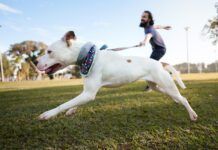Never before have ordinary owners had the opportunity to make such a difference in the health of all dogs. Im talking about the canine rabies vaccine challenge study that just got underway at the University of Wisconsin School of Veterinary Medicine in Madison. Dr. Ronald Schultz, a leading authority on veterinary vaccines and chair of the Department of Pathobiological Sciences there, has begun concurrent five- and seven-year challenge studies to determine the long-term duration of immunity of the canine rabies vaccine, with the goal of extending the state-mandated interval for boosters. These will be the first long-term challenge studies on the vaccine to be published in the U.S.

288
Because the USDA does not require vaccine manufacturers to provide long-term duration of immunity studies documenting maximum effectiveness when licensing their products, concerned dog owners have contributed the money to fund this research themselves, explains Kris. L. Christine, co-trustee of The Rabies Challenge Fund, a charitable trust organized to fund the studies. We want to ensure that rabies immunization laws are based upon independent, long-term scientific data.
Yes, Ive previously pleaded for your support of for this project. You see, while the canine rabies vaccine has undoubtedly saved countless lives, many attentive owners have observed its ability to cause serious side effects and trigger lifelong health problems in their dogs. Adverse reactions include auto-immune diseases affecting the thyroid, joints, blood, eyes, skin, kidney, liver, bowel, and central nervous system; anaphylactic shock; aggression; seizures; epilepsy; and fibrosarcomas at injection sites. Ive seen it myself; the formerly stable health of my own dog, Rupert (now deceased), took a sudden dive after receiving a legally mandated rabies booster (required for licensing) at age 10.
Scientific data published in 1992 demonstrated that dogs were immune to a rabies challenge five years after vaccination. Dr. Schultzs serological studies have documented antibody titer counts at levels known to confer immunity to rabies seven years post-vaccination. This data strongly suggests that state laws requiring annual or triennial rabies boosters for dogs are redundant.
W. Jean Dodds, DVM, a world-renowned veterinary research scientist and practicing clinician, serves as co-trustee of The Rabies Challenge Fund. This is the first time in my 43 years of involvement in veterinary issues that what started as a grass-roots effort to change an outmoded regulation affecting animals will be addressed scientifically by an acknowledged expert to benefit all canines in the future, says Dr. Dodds.
The Fund recently met its goal to fund the studies first year. However, annual budget goals of $150,000 for the studies must be met. See rabieschallengefund.org or call the Fund at (714) 891-2022 to learn how you can support this research and all dogs who are legally required to receive the rabies vaccine.
-Nancy Kerns







